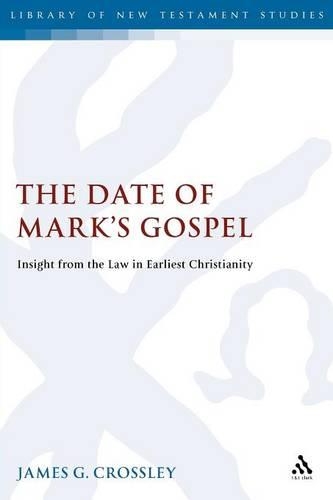
The Date of Mark's Gospel: Insight from the Law in Earliest Christianity
(Paperback)
Publishing Details
The Date of Mark's Gospel: Insight from the Law in Earliest Christianity
By (Author) Prof. James G. Crossley
Bloomsbury Publishing PLC
T.& T.Clark Ltd
1st May 2004
United Kingdom
Classifications
Tertiary Education
Non Fiction
226.3067
Physical Properties
Paperback
262
Width 156mm, Height 234mm
412g
Description
This book argues that Mark's Gospel was not written as late as c.65-75 CE, but dates from sometime between the late 30s and early 40s CE. It challenges the use of the external evidence (such as Irenaeus and Clement of Alexandria) often used for dating Mark, relying instead on internal evidence from the gospel itself. James Crossley also questions the view that Mark 13 reflects the Jewish war, arguing that there are other plausible historical settings -- for example the Caligula crises -- going on, to critically examine other arguments that place the writing of Mark as either around the time of the Jewish war, or at least after Paul's letters. The Date of Mark's Gospel argues that the gospel makes numerous Jewish assumptions, particularly concerning law observance. It shows that the synoptic gospels all portray Jesus as a law-observant Jew, before arguing more specifically that Mark assumes that Jesus fully observed biblical law:, while Matthew and Luke had to make this explicit. Mark could only make such an assumption at a time when Christianity was largely law observant: and this could not have been later than the mid-40s, after which certain Jewish and gentile Christians were no longer observing some biblical laws (e.g. food, Sabbath).
Reviews
"Crossley offers interesting and potentially valuable discussion on the interpretation of the legal passages in the Synoptic Gospels" William R. Telford, Biblica Vol. 88 Fasc. 1, 2007 -- William R. Telford
'interesting and potentially valuable discussion on the interpretation of legal passages in the Synoptic Gospel' - William R. Telford, Biblica -- William R. Telford
"Crossley's thesis is tightly argued and convincing in many respects. His critique of the traditional means of dating Mark is particularly compelling, confirming the uncertainties of traditional arguments and the danger of insisting in a particular Sitz im Leben." Mark Strauss, Bulletin for Biblical Research, 18.1 -- Mark Strauss
"Crossley has demonstrated a comprehensive understanding of the many problems concerning the date of Mark." -The Catholic Biblical Quarterly, 2005 * Catholic Biblical Quarterly *
'...The author's critical examination of the individual arguments for dating Mark around 70 CE deserves serious consideration, and his treatment of early Christian attitudes toward the Torah often displays fascinating detective work...offers a good jolt out of scholarly complacency.' -- Daniel J. Harrington * Journal of Religion *
"The author, picking up a line of argument forwarded earlier by W. C. Allen and more recently by M. Casey, attempts nothing less than developing a new approach to date Mark's Gospel. Crossley has written an interesting and provocative book. He clearly shows that the consensus date around 70 C.E. is based on arguments of doubtful validity....Crossley's arguments should be taken seriously, and his book deserves to be read by all interested in Mark's Gospel." - David du Toit, RBL, January 2006 * RBL *
"The attempt to establish the likelihood of a very early date for Mark draws on historically conservative scholarship, but the case is carefully argued. It is argued that Mark represents the Jesus tradition prior to the rapid expansion of the Gentile mission in the 40s. The book is well planned and well written." - John Painter, RBL, January 2006 * RBL *
Author Bio
James G. Crossley is Professor of Bible at St. Mary's University Twickenham, UK. His most recent publications include Harnessing Chaos, published in paperback by Bloomsbury T&T Clark in 2016.
